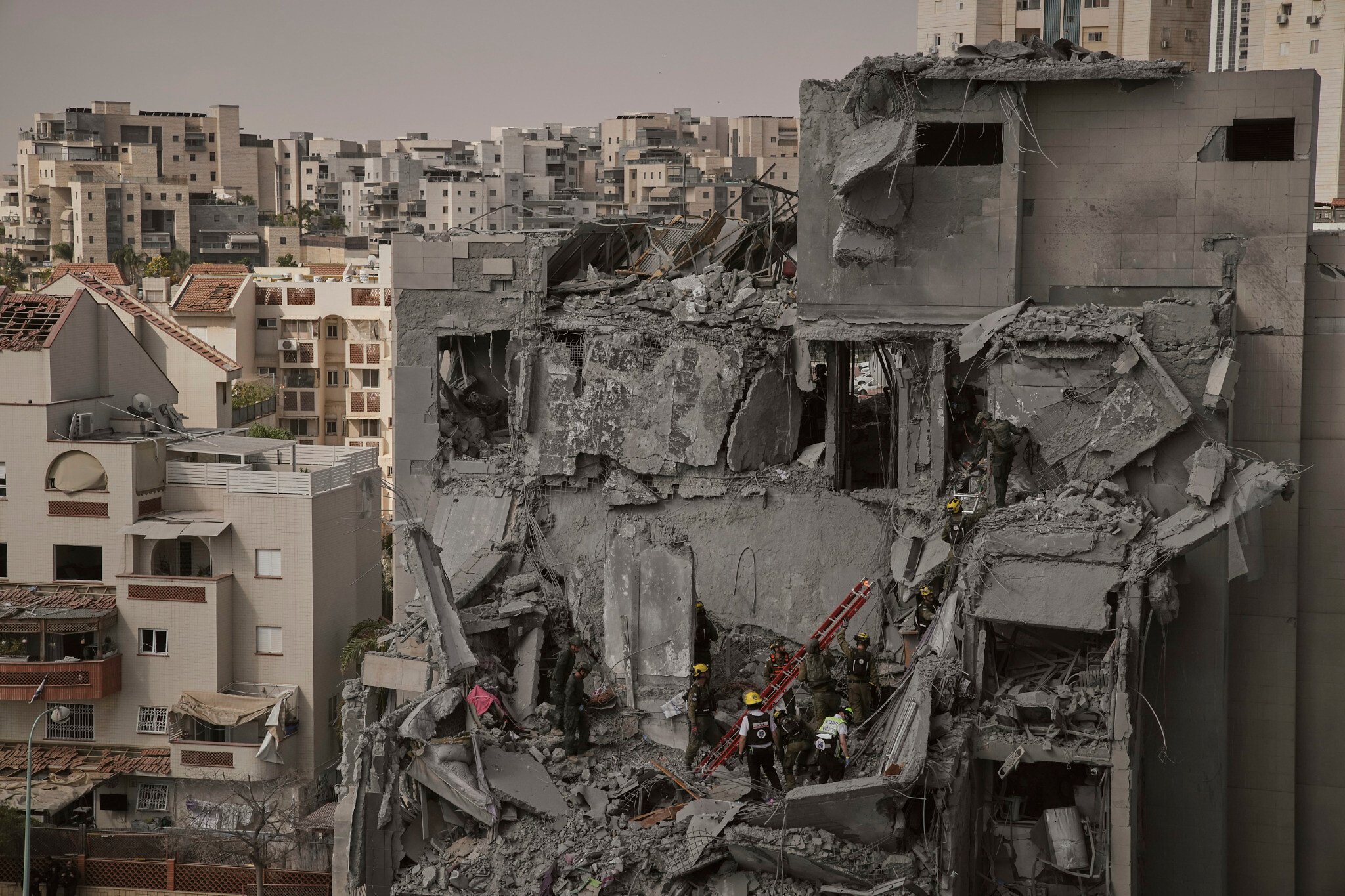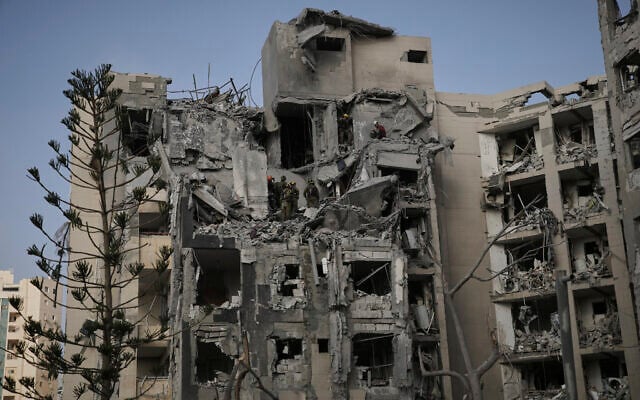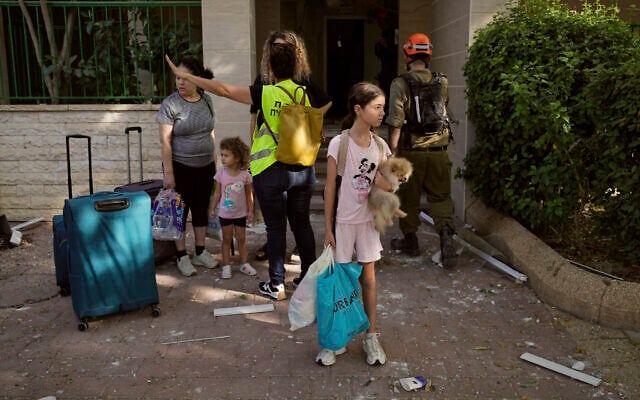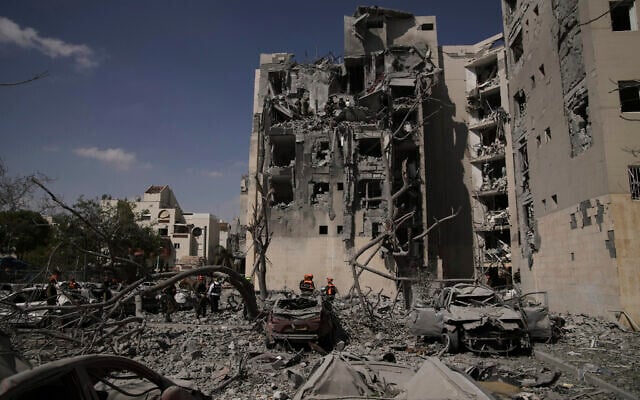



Four people were killed and at least 22 others injured Tuesday morning when Iran fired six missile barrages in quick succession at Israel in the final hours before the start of a 7 a.m. ceasefire (Israel time) announced by US President Donald Trump.
Both Israel and Iran subsequently said they had accepted the truce, seemingly ending 12 days of fighting.
Starting shortly after 5 a.m., missiles repeatedly targeted the country’s center, north and south, setting off sirens and sending millions of Israelis to bomb shelters.
Two missiles were fired at Beersheba in a salvo at 5:40 a.m., with one being intercepted and another striking the sixth floor of an apartment complex in the southern city, causing extensive destruction, including collapsing part of the building.
The building was relatively new, and homes had their own reinforced rooms. However, the missile directly hit two safe rooms, killing those inside them, according to a preliminary probe by Home Front Command. One of the bomb safe rooms was destroyed by the impact, the probe found.
Three members of one family were killed in one of the safe rooms, while the fourth person was killed in the second reinforced room.
The reinforced rooms are designed to sustain the shockwave of ballistic missiles as well as shrapnel — though not a direct strike from a large explosive warhead. Home Front Command says shelters are still the safest place to be during ballistic missile attacks.
The Israeli Air Force was investigating why the missile was not intercepted by air defenses.
The Magen David Adom emergency service identified three of the fatalities as a woman in her 40s, a man in his 40s and a man in his 20s. Details on the fourth were not immediately released.
In addition to the four killed, MDA said it treated two others in moderate condition and 20 others lightly hurt or suffering acute anxiety. Three people were extracted alive from beneath the rubble.
Other buildings nearby were also damaged.
Outside the ruined building, the shells of burned-out cars littered the streets. Broken glass and rubble covered the area. Hundreds of emergency workers gathered to search for anyone else trapped inside.
Soroka Medical Center in Beersheba said the hospital was treating 10 people, two of whom were in moderate condition, with the rest lightly injured.
The hospital was itself badly damaged by an Iranian missile on Thursday.
Some 20 ballistic missiles were launched by Iran in the six Tuesday morning salvos, according to Israel Defense Forces assessments. Most of the missiles were intercepted by air defense systems.
In Nof HaGalil in the north of the country, a man was seriously injured, apparently hurting himself while seeking shelter, medics said. The man suffered a head injury and was found unconscious, MDA reported.
MDA said it did not receive any other reports of people who had injured themselves while running to shelters, a common occurrence during attacks.
The first barrage began around 5 a.m., and the final missile warnings arrived shortly after 7 a.m. Amid the attacks, sirens repeatedly went off throughout the country, with civilians repeatedly instructed to enter bomb shelters.
Some three hours after the first barrage was fired, Home Front Command finally said people no longer needed to remain close to shelters.
Meanwhile, the IDF said that in the morning hours, the Israel Air Force struck eight Iranian ballistic missile launchers in western Iran, which were primed to immediately fire at Israel. The military issued footage of the strikes.
The airstrikes foiled a larger attack, according to the military. It was unclear if the strikes took place before the Iranian missile salvos or as they were launched.
Trump said later that the ceasefire between Iran and Israel was in effect and called on the sides to adhere to it.
Both Tehran and Jerusalem indicated they intended to do so.
The Prime Minister’s Office said in a statement that “In light of achieving the objectives of the campaign, and in complete coordination with President Trump, Israel agreed to the president’s proposal for a mutual ceasefire.”
“Israel will forcefully respond to any violation of the ceasefire,” the statement warned.
Iran’s Press TV said that the ceasefire came into effect with the conclusion of the multiple missile barrages fired at Israel.
There were no reports of Israeli strikes in Iran after 4 a.m. Heavy Israeli strikes continued in Iranian cities until shortly before that hour.
Israeli Air Force fighter jets hit dozens of Iranian military targets in Tehran overnight, dropping over 100 munitions, IDF Spokesman Brig. Gen. Effie Defrin said in a press conference after the ceasefire took effect. He said the strikes again targeted the “headquarters of the SPND nuclear project” and weapon production sites in the Iranian capital.
Defrin also said that “the IDF fully met all of its objectives” that it had determined ahead of the war. “The chief of staff has instructed the IDF to remain on high alert and prepared for a powerful response to any violation of the ceasefire,” he said.
Trump’s announcement that Israel and Iran had agreed to a “complete and total ceasefire” came soon after Iran launched a limited missile attack Monday on a US military base in Qatar, retaliating for the American bombing of its nuclear sites. The US was warned by Iran in advance, and there were no casualties.
Trump’s announcement on Truth Social said the ceasefire beginning about midnight Washington time would bring an “Official END” to the war.
Sunday’s US strikes on Iranian nuclear facilities came nine days into Israel’s sweeping assault, which began June 13, targeting Iran’s top military leaders, nuclear scientists, uranium enrichment sites, and the country’s ballistic missile program.
Israel said the campaign was necessary to prevent the Islamic Republic from realizing its declared plan to destroy the Jewish state.
Iran, which avowedly seeks Israel’s destruction, has consistently denied seeking to acquire nuclear weapons. However, it has enriched uranium to levels that have no peaceful application, has obstructed international inspectors from checking its nuclear facilities, and expanded its ballistic missile capabilities. Israel says Iran has recently taken steps toward weaponization.
Iran retaliated to Israel’s attacks by launching over 550 ballistic missiles and around 1,000 drones at Israel. Iran’s missile attacks killed 28 people and wounded thousands in Israel, according to health officials and hospitals. Missiles have hit apartment buildings, a university, and a hospital, causing heavy damage.





